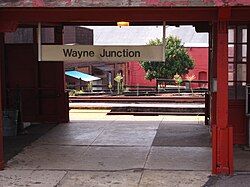Nicetown–Tioga, Philadelphia
Nicetown–Tioga | |
|---|---|
 The Wayne Junction train station is located in Germantown, Pa 19144. | |
| Coordinates: 40°00′47″N 75°09′22″W / 40.013°N 75.156°W | |
| Country | |
| City | Philadelphia |
| Area code(s) | 215, 267 and 445 |
Nicetown–Tioga is a neighborhood in the North Philadelphia section of the city of Philadelphia, Pennsylvania, U.S. It comprises two smaller, older neighborhoods, Nicetown and Tioga, although the distinction between the two is rarely emphasized today. The name "Nicetown" is often simply used to refer to any part of Nicetown–Tioga.
Geography
[edit]
The boundaries of Philadelphia neighborhoods are often not universally agreed upon. There are no "official" boundaries to the Nicetown–Tioga area, but some possible boundaries are:
- Wingohocking Street to the northeast (beyond which lies Logan);
- Clarissa/Windrim to the northwest (beyond which lies Germantown);
- Allegheny Avenue and the SEPTA rail tracks to the south (beyond which lie Allegheny West and Glenwood); and
- Old York Road to the east (beyond which lies Hunting Park).
The Philadelphia City Planning Commission (PCPC) defines Nicetown as a much smaller area bounded by Wingohocking Street, Broad Street, Hunting Park Avenue, and Clarissa Street;[1] it defines Tioga as a smaller area bounded by Broad Street, Hunting Park Avenue, the railroads [exact western boundary unclear], and Allegheny Avenue.[1]
History and economy
[edit]1700 to 1850
[edit]This section needs expansion. You can help by adding to it. (June 2008) |
Nicetown began centuries ago as a small town in what was then rural Philadelphia County, outside the City of Philadelphia (which occupied the area known today as Center City). Mease notes that Nicetown was named for Hans te Neues, a Mennonite immigrant who purchased the land of present-day Nicetown in 1699. Family legend among the Nice/Nyce family states that Hans threw a bottle of schnaps over his first house to christen it. This original early 18th-century structure burned in 1800. Hans and his brother Jan had emigrated from Amsterdam in 1698; Jan settled in Germantown. Both were Mennonite ministers and could read and write. Hans and his descendants were well known as zimmermen (builders of houses). One descendant was a member of the Carpenter's Society of Philadelphia in the early 1800s. Another was Captain John Nice of Germantown, who led the charge at the Battle of Germantown during the Revolutionary War. Other authors provide varied suggestions for the origin of Nicetown. Finkel says that it was "[n]amed for de Neus, Dutch Huguenots who settled there about 1700".[2]
In 1729, Elizabeth McGawley, "an Irish lady who had brought over a number of tenantry," was said to have attended Mass at Nicetown. Not far was the home of John Michael Browne (1703-1750), of Tuam, Ireland. He came from the West Indies in 1742 and purchased acreage in the area and was said to be a "priest." Paul Miller held services at his home near present day 7th St. and West Hunting Park Avenue. It served Catholics living in nearby Frankford, Germantown, Nicetown and what would become Franklinville. Services were held by priests from Saint Joseph's and those traveling to and from Philadelphia.[3]

Tioga is a placename used in various places. According to several sources,[4][5] Tioga is a Mohawk and Iroquois word referring to a place where a stream or river current forks or runs swiftly. The name has been used in North Philadelphia since at least the mid-19th century.[6]
1950 to present
[edit]The industrial culture of the area peaked during World War II, and declined immediately following the war. White flight began in the 1950s and hastened in the 1960s through the 1980s. There are a number of abandoned structures and a high crime rate in the neighborhood (leading some to note the irony of its name[7]).
Demographics
[edit]As of 2021, Nicetown–Tioga was 75.5% African American, 24.5% white.[8] Though it is a predominantly black neighborhood, there is an increasingly significant number of Hispanics, particularly in the southeastern section near Hunting Park.[9]
Education
[edit]Public libraries
[edit]Free Library of Philadelphia operates the Nicetown–Tioga Branch at 3720 North Broad Street.[10] The Free Library of Philadelphia also runs a Hot Spot location in Nicetown, operating out of Mercy Neighborhood Ministries, the purpose of which is to increase computer access to residents.[11]
Natural gas power plant (SEPTA)
[edit]In November 2016, SEPTA board members approved a $26.8 million natural gas power plant near Wayne Junction Station. It is an 8.8-megawatt plant and would allow regional rail to function in the event of a blackout. Noresco LLC will design the two piston-engine generators that will be located between the Roberts Avenue Rail Yard and the Midvale Bus Depot.[12]
See also
[edit]Citations
[edit]- ^ a b "Big Thompson Watershed Forum". btwatershed.org. Archived from the original on October 11, 1999. Retrieved 8 July 2023.
- ^ Finkel 1995, p. 165.
- ^ http://www.saintstephensalumni.com/Docs/History%20of%20Saint%20Stephen.pdf
- ^ USDA Forest Service webpage on American-Indian-language-derived names. Accessed 2007-12-06.
- ^ "Tioga Pass Resort history webpage. Accessed 2007-12-06". Archived from the original on 2007-09-28. Retrieved 2007-12-06.
- ^ Finkel 1995, p. 170.
- ^ Ellison, Charles D. (2019-08-15). "Reality Check: Of Course, It Was Nicetown". The Philadelphia Citizen. Retrieved 2023-04-16.
- ^ "U.S. Census website". United States Census Bureau. Retrieved 2008-01-31.
- ^ "Philadelphia City Planning Commission | Homepage". City of Philadelphia. 3 April 2023. Retrieved 8 July 2023.
- ^ "Nicetown–Tioga Branch." Free Library of Philadelphia. Retrieved on November 7, 2008.
- ^ "Free Library Hot Spots". FLP.
- ^ Laughlin, Jason (17 November 2016). "SEPTA approves natural gas power plant". philly.com.
General bibliography
[edit]- Finkel, Kenneth, ed. (1995), Philadelphia Almanac and Citizens' Manual, Philadelphia: Library Company of Philadelphia, pp. 156–170, ISBN 0-914076-89-2

